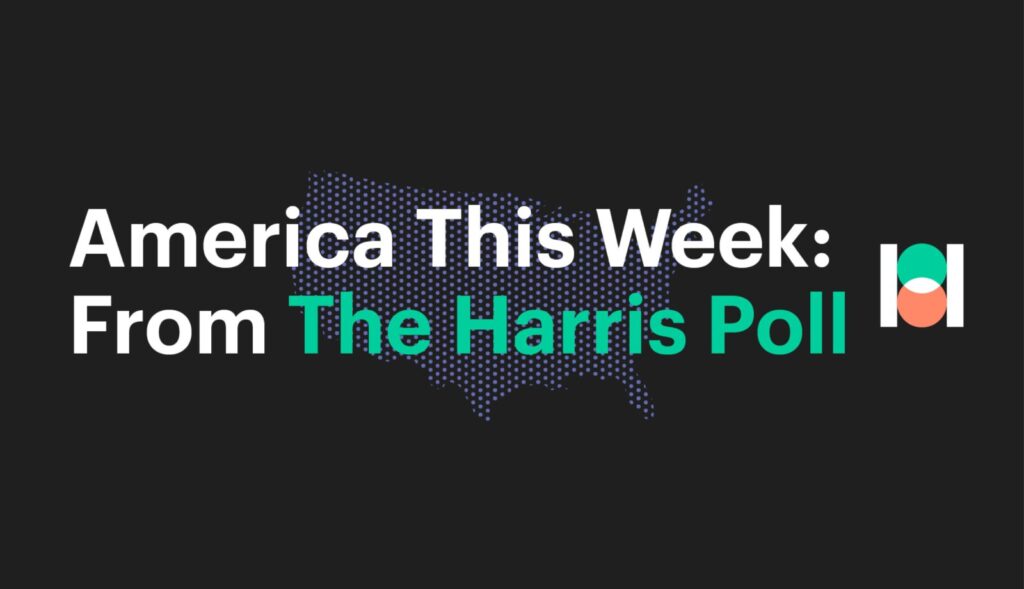Brief • 4 min Read
America This Week: Boomer, Where’s My Money? Moms in Crisis, Switching Jobs Without a Net and The Problem With Online Banks
The latest trends in society and culture from The Harris Poll
According to the CDC, over half of all U.S. states report “very high” COVID-19 infections this summer. In this past weekend’s America This Week tracker, fielded August 9th to 13th, among 3,604 Americans, nearly half (49%) are concerned about new variants but lag behind worries around the economy, political divisiveness, and global instability.
Quick plug: How culturally relevant is your brand? Movers+Shakers‘ and The Harris Poll have developed an index on how brands achieve cultural relevance amongst Gen Z. Please help us by voting for our SXSW PanelPicker here.
Ok, this week, we have four new Harris polls that caught our interest:
- According to our research, there’s a Boomer wealth transfer that is over-hyped.
- One of our strategists brought her personal experience to researching postpartum depression in mothers.
- And with the roller-coaster markets, new concerns about job security are bubbling up.
- Lastly, we dive into the cybersecurity headaches of online banks.
The Lackluster Wealth Transfer: Northwestern Mutual-Harris Poll
With the largest number of Baby Boomers retiring this year, many of their kids have outsized expectations of an inheritance, according to our new survey with Northwestern Mutual in Fortune.
- Expecting more than there is: While (32%) of Millennials and (38%) of Gen Zers expect an inheritance, only (22%) of Gen X and Boomers plan on giving one.
- Cash-strapped Millennial families are the likeliest (59%) to say an inheritance is “highly critical” to their security.
- Still, Gen Z and Millennials are willing to pass it down: (75%) of Gen Z and (81%) of Millennials say leaving an inheritance is their single most important financial goal or very important (v. Gen X/Boomers+: 46%).
Takeaway: Murmurs of a “Great Wealth Transfer” might be more like “Meh.” In six years, all Boomers will be 65. Given that the Silent Generation and Baby Boomers account for a more significant share of the nation’s wealth, it needs to be clarified how the post-pandemic economic malaise has affected the estimated windfall of $90 trillion. That much money changing hands could create an unprecedented change in household wealth. But how much trickles down remains to be seen.
Many New Moms Feel Forgotten: The Harris Poll’s State of Maternal Health Report
In our second annual State of Maternal Health Report, featured in HR Dive, we reveal significant shortcomings in the health information and support women in the U.S. receive throughout their pregnancy and postpartum journey.
- Left uninformed: More than half of women who have been pregnant (53%) felt under-supported and did not receive any (40%) or enough (13%) information or resources on postpartum depression.
- One in eight women (13%) currently or have been pregnant say they were diagnosed with postpartum depression by a medical professional – jumping to (29%) among women ages 18-34 (v. 35+: 10%).
- Inadequate postpartum care: Nearly a quarter of all Mothers (24%) rate their postpartum care as less than adequate (18-34: 36%).
- Additionally, (74%) of all women agree that there isn’t enough focus on postpartum healthcare for mothers, and nearly two-thirds (64%) feel that mothers are often forgotten once the baby arrives.
Takeaway: “These statistics are not just numbers; they represent the real struggles of mothers nationwide, including myself, who feel neglected by the systems meant to support them,” expressed Christina Lojek, Research Manager at The Harris Poll. “Fueled by my own experiences, I chose to lead this study, and it solidifies how imperative it is that we improve postpartum support and education for mothers who are asking for and deserving of much better care.”
Layoff Whiplash: Express Employment Professionals-Harris Poll
In our new survey with Express Employment Professionals, featured by HR Dive, more employed job seekers fear losing their jobs before finding a new one.
- Nearly a third of employed job seekers now report concerns about unexpected layoffs, increasing from (28%) in the fall of 2023 and (24%) in the spring of 2023.
- Overworked and underpaid: (44%) said their biggest fear was not receiving a salary increase or raise they deserve at their current company.
- Looking for greener pastures: Employed job seekers said the top reasons for their job search were better compensation (46%), better work/life balance (41%), and better growth opportunities in their industry (41%).
- More than half described their current job as one that earns money rather than having a “career” that not only earns money but also provides enjoyment and pride – a sentiment felt especially by Gen Z (74%).
Takeaway: “The only benefit I get from the job is a paycheck. No added value to my life or my personal growth or professional development,” one job seeker wrote in the survey responses. With the unemployment rate jumping to 4.3% in the latest U.S. Bureau of Labor Statistics report, economists told HR Dive the labor market is now “in a perilous spot” and “at an inflection point.” They said several signs indicate a slowdown, including that job loss may be on the rise (HR Dive).
Are Online Banks Really Banks? Apiture-Harris Poll
With the economy being a top-of-mind issue for Americans, we partnered with Apiture to explore the role of banks and credit unions in everyday life.
- A significant trust gap for online banks: Over half of Americans trust large or local banks and credit unions, while just (35%) trust online-only banks.
- Identity theft headaches are common: Nearly (40%) of Americans have experienced identity theft or fraud, such as data breaches that compromise personal information or phishing attempts.
- Demand for better cybersecurity: The majority of the public (87%) say financial institutions should invest in more significant cybersecurity measures, including enhanced security protocols, with (86%) calling for two-factor authentication.
- Left to monitor themselves: Nine in ten Americans (91%) regularly review their financial statements for unusual activity or unauthorized transactions.
Takeaway: The study reveals that while traditional financial institutions also have to earn greater trust, online-only banks face increased investor skepticism. A considerable portion of the population has experienced identity theft, so there is an apparent demand for improved cybersecurity measures. The findings emphasize the importance of financial institutions investing in and prioritizing robust security protocols to build consumer trust.
Subscribe for more Insights
Subscribe to our newsletter for the latest trends in business, politics, culture, and more.
Related Content









